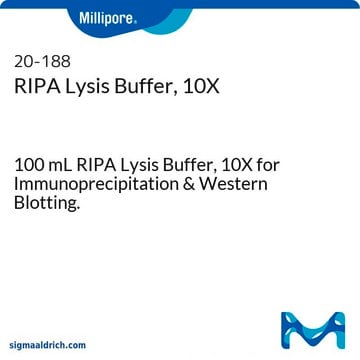C2978
CelLytic™ M
Cell Lysis Reagent, Suitable for Mammalian cell lysis and protein solubilization.
Synonym(s):
Whole-cell protein extraction solution
Sign Into View Organizational & Contract Pricing
All Photos(1)
About This Item
UNSPSC Code:
41116134
NACRES:
NA.56
Recommended Products
General description
CelLytic M is a proprietary detergent solution designed for efficient whole-cell protein extraction from cultured mammalian cells. It enables efficient and rapid cell lysis and solubilization of proteins for both suspension and adherent cells. Lysates can be used in many downstream applications without removing the CelLytic M such as reporter gene assays, Western blots/immunoprecipitation, electrophoretic mobility shift assays, phosphatase assays and kinase asssays.
Features and Benefits
- Efficient: Up to 50% more efficient than freeze thaw, sonication and other products
- Non-denaturing: Does not interfere in downstream applications such immunoprecipitation, kinase and phosphatase assays, reporter gene assays and gel shift assays
- Convenient: Ready-to-use reagent requires no scraping from culture plates
- Fast: Rapid cell lysis at room temperature.
Quantity
CelLytic M reagent efficiency for protein extraction has been tested on, but not limited to, HeLa, CHO, COS, HL-60, Jurkat, A431, PC-12, and Bovine Aorta Endothelial Cells (BAEC).
Analysis Note
Use 125 μl CelLytic M for 106-107 of suspended cells. For adherent cells, use 500-1,000 μL for a 100 mm plate; 200-400 μL for a 35 mm plate.
Legal Information
CelLytic is a trademark of Sigma-Aldrich Co. LLC
Storage Class Code
12 - Non Combustible Liquids
WGK
WGK 2
Flash Point(F)
Not applicable
Flash Point(C)
Not applicable
Choose from one of the most recent versions:
Certificates of Analysis (COA)
Lot/Batch Number
Don't see the Right Version?
If you require a particular version, you can look up a specific certificate by the Lot or Batch number.
Already Own This Product?
Find documentation for the products that you have recently purchased in the Document Library.
Customers Also Viewed
Filipe Cabreiro et al.
Free radical biology & medicine, 51(8), 1575-1582 (2011-08-16)
The superoxide free radical (O(2)(•-)) has been viewed as a likely major contributor to aging. If this is correct, then superoxide dismutase (SOD), which removes O(2)(•-), should contribute to longevity assurance. In Caenorhabditis elegans, overexpression (OE) of the major cytosolic
Moon Kyung Joo et al.
Journal of gastroenterology and hepatology, 31(10), 1717-1726 (2016-10-30)
The aim of this study was to compare HOXB7 expression level between gastric cancer and non-cancerous gastric tissues. Additionally, the functional effects of HOXB7, including its pro-migration or invasion and anti-apoptosis roles, were evaluated in gastric cancer cells. Both gene
Liliana F Iannucci et al.
Scientific reports, 7(1), 2023-2023 (2017-05-19)
Nonalcoholic fatty liver disease (NAFLD) is a major health problem worldwide, and is often associated with lipotoxic injury, defective mitochondrial function, and insulin resistance. Thyroid hormones (THs) are important regulators of hepatic lipid metabolism. Among the THs, diiodothyronine (T
Vinay Kumar Tripathi et al.
Molecular neurobiology, 54(5), 3633-3651 (2016-05-22)
Expression of various cytochrome P450s (CYPs) in mammalian brain cells is well documented. However, such studies are hampered in neural/glial cells of human origin due to nonavailability of human brain cells. To address this issue, we investigated the expression and
Nektarios Barabutis et al.
American journal of physiology. Lung cellular and molecular physiology, 308(8), L776-L787 (2015-02-26)
New therapies toward heart and blood vessel disorders may emerge from the development of Hsp90 inhibitors. Several independent studies suggest potent anti-inflammatory activities of those agents in human tissues. The molecular mechanisms responsible for their protective effects in the vasculature
Our team of scientists has experience in all areas of research including Life Science, Material Science, Chemical Synthesis, Chromatography, Analytical and many others.
Contact Technical Service
















